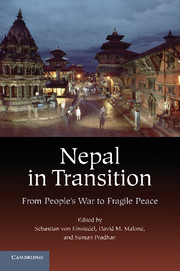Book contents
- Frontmatter
- Contents
- Contributors
- Acknowledgments
- 1 Introduction
- The Context
- Critical Transition and the Role of Outsiders
- 6 Nepal's Masala Peacemaking
- 7 A Comprehensive Peace? Lessons from Human Rights Monitoring in Nepal
- 8 The United Nations and Support to Nepal's Peace Process: The Role of the UN Mission in Nepal
- 9 The 2008 Constituent Assembly Election: Social Inclusion for Peace
- 10 Revolution by Other Means: The Transformation of Nepal's Maoists in a Time of Peace
- Regional Dynamics
- Conclusions
- Index
- References
10 - Revolution by Other Means: The Transformation of Nepal's Maoists in a Time of Peace
Published online by Cambridge University Press: 05 April 2012
- Frontmatter
- Contents
- Contributors
- Acknowledgments
- 1 Introduction
- The Context
- Critical Transition and the Role of Outsiders
- 6 Nepal's Masala Peacemaking
- 7 A Comprehensive Peace? Lessons from Human Rights Monitoring in Nepal
- 8 The United Nations and Support to Nepal's Peace Process: The Role of the UN Mission in Nepal
- 9 The 2008 Constituent Assembly Election: Social Inclusion for Peace
- 10 Revolution by Other Means: The Transformation of Nepal's Maoists in a Time of Peace
- Regional Dynamics
- Conclusions
- Index
- References
Summary
This chapter traces the transformation of the Maoist party since the end of the People's War. The Maoists saw the peace process as a bargain through which they would enter peaceful multiparty competition; abandon crucial sources of power, in particular the People's Liberation Army and parallel government structures; and renounce all use of force in return for the abolition of the monarchy and the socioeconomic transformation of the Nepali state and society.
Yet, as the peace process progressed, the Maoist party found other means of expanding its power base. From its inception, the Maoists shored up their popular support through their far-reaching transformation agenda, which contrasted sharply with the other parties’ general lack of programmatic vision. The Maoists also exploited a weak state to expand their reach into society through illiberal methods.
- Type
- Chapter
- Information
- Nepal in TransitionFrom People's War to Fragile Peace, pp. 265 - 284Publisher: Cambridge University PressPrint publication year: 2012
References
- 6
- Cited by



